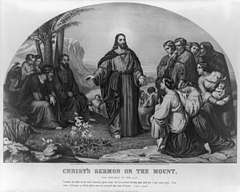Matthew 6:28
Matthew 6:28 is the twenty-eighth verse of the sixth chapter of the Gospel of Matthew in the New Testament and is part of the Sermon on the Mount. This verse continues the discussion of worry about material provisions.
| Matthew 6:28 | |
|---|---|
← 6:27 6:29 → | |
 Christ's sermon on the mount: The parable of the lily (1866). | |
| Book | Gospel of Matthew |
| Christian Bible part | New Testament |
Content
In the King James Version of the Bible the text reads:
- And why take ye thought for raiment?
- Consider the lilies of the field, how they grow;
- they toil not, neither do they spin:
The World English Bible translates the passage as:
- Why are you anxious about clothing?
- Consider the lilies of the field, how they grow.
- They don’t toil, neither do they spin.
Commentary
Two verses earlier at Matthew 6:26 Jesus told his followers not to worry about food, because even the birds are provided for by God. In this verse Jesus presents the example of the lilies, who also do no labour. Spin in this verse is a reference to spinning thread, a labour-intensive but necessary part of making clothing. Spinning was traditionally women's work, something made explicit in Luke's version of this verse. This then is one of the few pieces of evidence that Jesus' message is meant equally for women as for men.[1]
Many varieties of flowers grow wildly and abundantly in Galilee. The translation of lilies is traditional, but far from certain. Modern scholars have proposed a number of different flowers that Jesus could be here referring to (the Greek word is κρίνον, krinon), according to Fowler these include the autumn crocus, scarlet poppy, Turk's cap lily, Anemone coronaria, the narcissus, the gladiolus, and the iris.[2] France notes that flowers were less specifically defined in that era, and lily could be a word referring to any showy variety.[3] The verse could also just mean flowers in general, rather than a specific variety. "In the field" implies that these are the wildflowers growing in the fields, rather than the cultivated ones growing in gardens. Harrington notes that some have read this verse as originally referring to beasts rather than flowers.[4]
Cultural references
This verse is quite a well known one, appearing frequently in art and literature. Keats' "Ode on Indolence" quotes it. P.G. Wodehouse humorously uses the phrase "lilies of the field" to refer to the idle rich who do no labour. Other writers such as Edith Wharton and A.M. Klein have also directed the phrase at the rich and idle. There is also a famous movie by this name.[5]
Other uses:
- In the 1963 feature film Lilies of the Field Sidney Poitier's character, Homer Smith, tries to persuade the mother superior to pay him by quoting Luke 10:7, "The laborer is worthy of his hire." Mother Maria Marthe (Lilia Skala, called "Mother Maria"), responds by asking him to read another Bible verse from the Sermon on the Mount: "Consider the lilies of the field, how they grow; they toil not, neither do they spin. And yet I say unto you that even Solomon in all his glory was not arrayed like one of these.”
- In "The Trouble with Tribbles", the 44th episode of the American science fiction television series Star Trek (episode first aired December 29, 1967), Mr. Spock, referring to the tribbles, which were small furry un-sentient creatures that did nothing but eat and procreate, says "They remind me of the lilies of the field. They toil not, neither do they spin. But they seem to eat a great deal. I see no practical use for them."
- In Ray Bradbury's Fahrenheit 451, Guy Montag attempted to memorize this verse while on a subway. He was unsuccessful due to the loud advertisements for Denham's Dentifrice.
- In Monty Python's satirical take on religious teachings, meanings and misunderstandings, Life of Brian's main character (portrayed by Graham Chapman) tries to give an impassioned impromptu sermon to a sceptical, heckling crowd who take the allegorical "Consider the lillies-" line literally, and take him to task for it.
References
- France, R.T. The Gospel According to Matthew: an Introduction and Commentary. Leicester: Inter-Varsity, 1985.
- Fowler, Harold. The Gospel of Matthew: Volume One. Joplin: College Press, 1968
- France, R.T.. The Gospel of Matthew. Wm. B. Eerdmans Publishing, 2007 pg. 269
- Harrington, Daniel J. The Gospel of Matthew. Liturgical Press, 1991 pg. 102
- "Lilies in the Field." A Dictionary of Biblical Tradition in English Literature. David Lyle Jeffrey, general editor. Grand Rapids: W.B. Eerdmans, 1992.
| Preceded by Matthew 6:27 |
Gospel of Matthew Chapter 6 |
Succeeded by Matthew 6:29 |